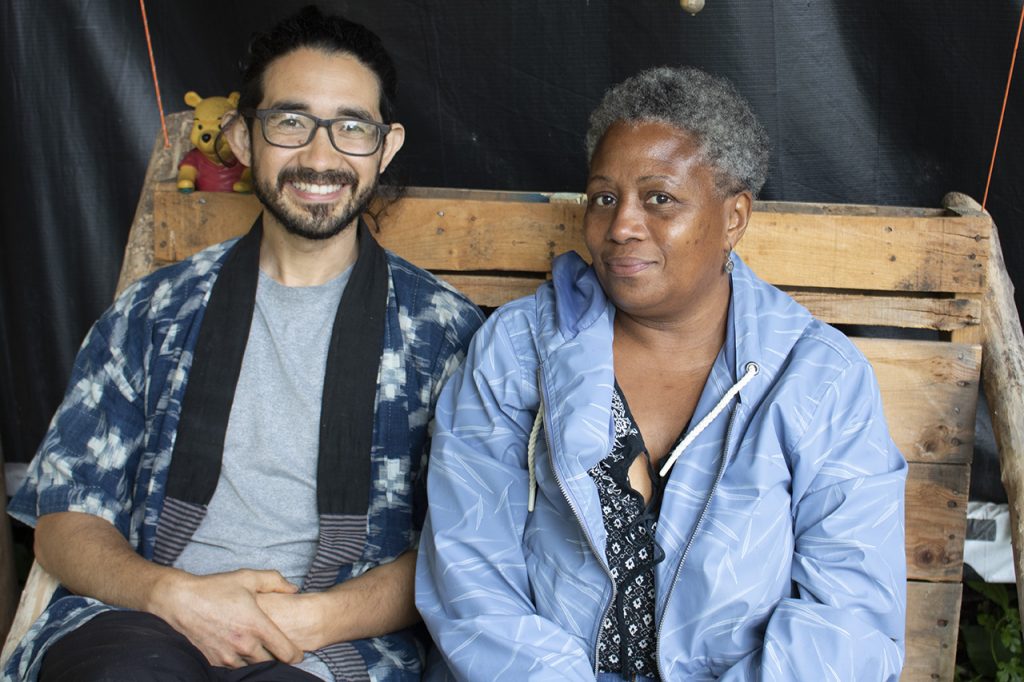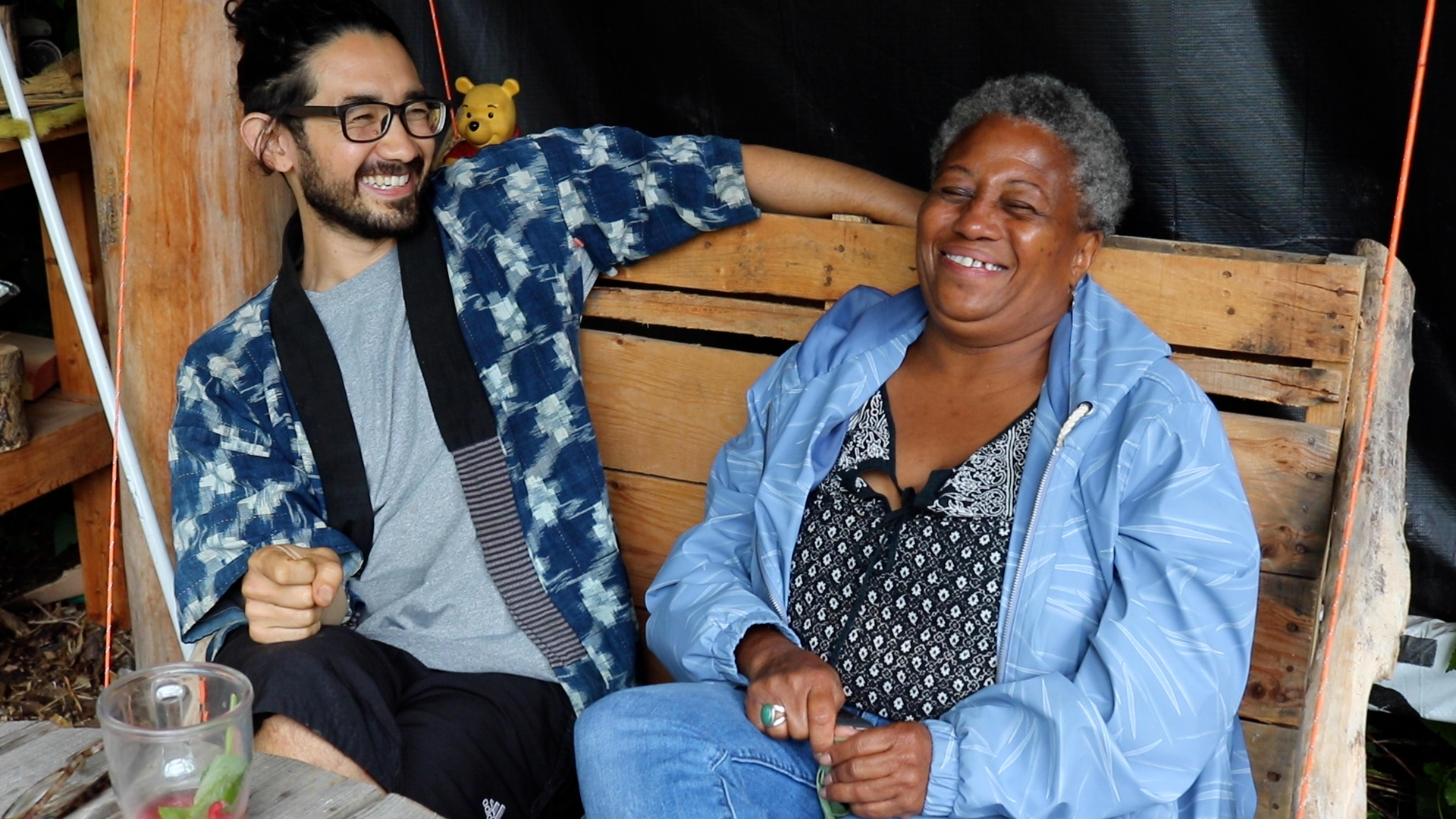Feedom Freedom Growers and Taproot Sanctuary Growing Community Care Through Gardening
Two east-side residents from very different backgrounds talk about their common ground through Grace Lee Boggs, gardening and visionary organizing.

Rooted shares stories about land tending, community healing and regeneration happening right here on the ancestral land of the Indigenous Anishinaabe, the area commonly referred to as Detroit.
In the latest installment of Rooted, Annamarie Sysling heads to Detroit’s Islandview and Jefferson Chalmers community to talk with two gardeners about land tending as a form of activism, cross cultural solidarity, and the role climate change plays and how we all connect with and protect the land we call home.

Nestled in the lush backyard garden of Taproot Sanctuary in Detroit’s Islandview neighborhood, artist, grower and practical philosopher en sawyer lee talks about the winding life journey that brought him to this space and into this community on Field Street. lee is also the co-founder of Taproot Sanctuary, a space that since its inception in 2016 has defined itself as “both a place where we practice right-relationship with ourselves, the earth and our neighbors, but also an invitation to cultivate that relationship with each moment.” Sitting alongside lee is Myrtle Thompson Curtis, the founder of Feedom Freedom Growers, “a community group and resource committed to growing community relationships through the cultivation of food, hearts and minds.” Thompson Curtis is a mother, grandmother, visionary, organizer and thinker in Detroit’s Jefferson Chalmers community.

Eastside Neighbors
“I would describe my community in Jefferson Chalmers as a mile away from the Detroit River, surrounded by wonderful parks and canals and beautiful people,” says Thompson Curtis, who explains the neighborhood has a mixture of high- and low-income households, renters and homeowners and a evolving business corridor. When it comes to how the community was impacted by the most recent extreme flooding event, Thompson Curtis explains that in addition to wiping out major appliances, mementos, cars and some of the food that was growing in the Feedom Freedom garden, the flood has also been devastating to the community’s morale. “It’s got people thinking about ways to navigate how we handle a future flooding,” she says. In addition to accepting help from volunteers who can come and assist with cleanup and other tasks, Thompson Curtis has also set up a crowdfunding campaign to help get the neighborhood back on solid footing.
Thompson Curtis says Feedom Freedom Growers (FFG) started in 2009 as a grassroots organization that was originally known as the Manistique Street Community Garden. “The people who became a part of that garden, we needed a name as we went out and did more of this work,” she explains, adding that “it’s an organization created to foster the principles of food sovereignty and to create a new center of work, of cooperation and interdependence, through growing food, nurturing creativity through art and education.” In addition to growing relationships, Thompson says those who tend to the garden are growing blackberries, blueberries, cherries, apples, strawberries, watermelon, herbs, lettuce, peas, okra, tomatoes, kale, collards and flowers. They also do bee-keeping.

Meanwhile, lee, who was born in Japan and grew up between there and California, describes Islandview as “about a mile from Belle Isle … right next to Indian Village and then West Village,” noting both of the aforementioned neighborhoods tend to be of a higher economic status while Islandview’s residents are a mixture of racial and socioeconomic backgrounds. This diversity is part of what makes it a unique community and also what makes solidarity crucial. lee is part of that neighborhood’s Field Street Block Club, which is crowdfunding to help offset the costs of heating and crucial home repairs for some residents who are not able to pay for those expenses out of pocket.
A Shared Respect For Late Detroit Social Justice Icon Grace Lee Boggs
Not far from Jefferson Chalmers, lee’s Islandview neighborhood has its own special history, energy and struggles. The Taproot garden is in the backyard of lee’s home and sits just down the block from the house formerly occupied by the legendary Detroit activist duo Jimmy and Grace Lee Boggs. While lee never met Jimmy or Grace Lee Boggs, he says that his partner Marcia Sawyer Lee was very close with Grace Lee Boggs at the end of her life and learned a great deal about community care through witnessing Boggs embodying the ethos of her teachings about visionary activism, social justice and equity and community stewardship and organizing.
Thompson Curtis on the other hand did meet and work with Grace Lee Boggs. “So when I met her, she was inspiring to me because of the work that me and my partner Wayne Curtis were doing in urban ag. And so she inspired me, took a strong interest. I had the opportunity to travel with her,” says Thompson Curtis, recalling a saying that she heard regularly from Boggs: “live simply so that others can simply live, and I do believe that might have come from Gandhi. But that is one of those small things that sticks with me when I think about this work that I do on a daily basis.”

Proactive Community Care Matters Now More Than Ever
As far as the connection between community gardening and activism, both lee and Thompson Curtis intertwine both seamlessly in their work. “Some folks might look at activism as working in policy or working in protests or, or things like that, but what are you doing to create resources? How do you produce in your area, it’s this new work,” notes Thompson Curtis. In her work in Jefferson Chalmers, she does so much more than growing food. She’s also leveraging social media channels to help get community members involved and informed, “we’ve partnered with artists to make signs, we’ve partnered with other organizations to create beautiful pavilions and farm stands, and we participate in a farmers market, we are part of the Eastside Solutionaries Collective.” She says that in the more than a decade she’s been doing this work, she’s learned that the more inclusive something can be, the better. “When you open up the space to allow others to participate, that’s when it becomes this bigger beautiful thing.”
One of the other programs in Jefferson Chalmers is the Green Chairs Not Green Lights program, which describes itself as “a counter-campaign to Project Green Light. It calls on [residents] to return to front porches and see each other.” Thompson Curtis and lee have collaborated on building out the community safety initiative in both of their neighborhoods in an effort to build solidarity, accountability and care. The program initially launched in 2019 with a variety of community organizations coming together to get it off the ground.
In looking back at the last year, which saw the growth of the Black Lives Matter movement and the COVID-19 pandemic, lee and Thompson Curtis say it solidified their belief in the work they’ve already been doing for years. “I don’t know if if the past year and a half changed the way I see the world, but in many ways it confirms just the urgency and the crisis that we’re living through. And you know, there is no return to normal. like what was before was not normal … certain people had access to stability, but the instability is reaching a more dangerous level,” says lee.

On what we collectively might be able to learn from the endless life cycles on display in a garden, lee draws teachings from the mushroom as a master of decomposition and transformation. “I’ve just been reading a lot from the author and speaker Bayo Akomolafe, who’s a really inspiring thinker and he talks about the importance of ‘composting man’ and so this is the age where we really have to decompose this image that we built of human beings being separate from the earth and being separate from … others as if we’re isolated beings. And and I think mushrooms … expose how interconnected everything is,” says lee. He also points to the necessity of decomposition in life as a point that some people may struggle with. He suspects this might be a symptom of our “death-phobic culture … we think about things in linearity like progress is one way straightforward, but really, it’s cycles and mushrooms help us remember that … death is as important as life because without death, there is no life.”
Get Involved
Islandview
-
Learn more about Taproot Sanctuary and their community offerings
-
Donate to the Field Street Block Club Heating and Home Repair Fund
-
Additional references: Poet Jericho Brown, speaker, thinker and teacher Bayo Akomolafe and writer and poet Wendell Berry
Jefferson Chalmers
-
Sign up to volunteer at Feedom Freedom Growers 10 a.m. – 12 p.m. Saturday, July 17 with WDET’s Annamarie Sysling or check here for other volunteer opportunities at FFG
-
Learn more about the community safety program Green Chairs Not Green Lights
-
Additional references: The Next American Revolution: Sustainable Activism for the Twenty-First Century, The Soul of Soil, Paul Robeson
Trusted, accurate, up-to-date.
WDET strives to make our journalism accessible to everyone. As a public media institution, we maintain our journalistic integrity through independent support from readers like you. If you value WDET as your source of news, music and conversation, please make a gift today.
